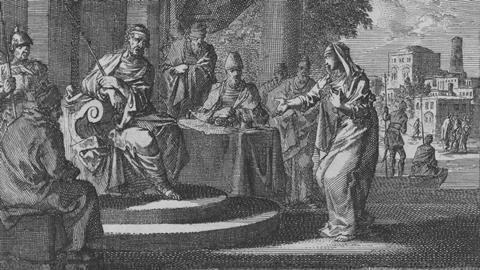Elaine Storkey believes too many preachers have interpreted this parable wrongly, and reveals what it teaches us today
Study passage: Luke 18:1-8
How many talks or sermons have you heard on prayer? I have heard too many to count. Some of them do give me a glimpse of the very heart of God, and his desire to bless us when we pray to him. But sometimes I find them less helpful, especially when they suggest that the problem is that I don’t pray hard enough! It’s even worse when they base this judgement on biblical texts. Some preachers even present me with a God who apparently must be persuaded by my insistence before he will listen to my needs.
People suggest Jesus’ parable of the persistent widow in Luke 18 gives this focus. I understand why. It’s a parable where Jesus urges his disciples to “always pray and not give up” (v1) by telling a vivid story of a widow who has been unjustly treated. This poor woman needs someone to adjudicate her case against the person who has wronged her and the only one who can do this and help her get justice is the local judge. Unfortunately, he is a man who has little interest in implementing the law, or in the needs of other people. What’s more, he cares nothing about God and is indifferent to public opinion. To him the widow doesn’t matter: she has no power or status and can therefore easily be ignored. But she is desperate and makes sure she is not ignored. She goes back again and again to plead her case: “Grant me justice against my adversary” (v3).
God loves us and wants to answer our prayers
At this point in the parable, the widow’s strategy becomes effective. The judge has a conversation with himself. This woman won’t leave him alone, and he wonders what she will do next. So even though he doesn’t care about God or what people think, he wants a quiet life so gives in to her pleas. He decides “because this widow keeps bothering me, I will see that she gets justice, so that she won’t eventually come and attack me!” (v5). And Jesus says: “Listen to what the unjust judge says. And will not God bring about justice for his chosen ones, who cry out to him day and night?” (v7).
Look out for suspect interpretations
Very often, preachers take the widow as our role model, and draw the conclusion that we, too, should be relentless in presenting our petitions to God. We should be constant in prayer, persistent in our pleading, ‘battering the doors of heaven’ until our prayers are answered. Like the early Church’s all-night prayer meeting when Peter was imprisoned, we must show we mean business in prayer. Our persistence will mean that God will eventually respond to our requests. They quote Jesus’ parable in Luke as the classic example: the judge gave in to the woman’s petition because of her sheer doggedness.
Yet this interpretation is somewhat disturbing. It suggests that God has better things to do with his time than attend to the things that bother us, so we need to continuously nag him before he will hear us. However, the ‘constant repetition’ doesn’t fit with Jesus’ other statements about prayer, especially in Matthew’s Gospel where he says “when you pray, do not keep on babbling like pagans, for they think they will be heard because of their many words” (Matthew 6:7). And it’s strange to think that Jesus wants us to wear ourselves out, imploring and beseeching before God until he finally gives in. Was Jesus really suggesting God is like the indifferent judge who shows no concern for people’s deepest needs and responds only when they make themselves a compete nuisance?
In fact, I believe this interpretation misses the point completely. For Jesus’ parable is to show that God is nothing like the unjust judge. The picture of the judge is in complete contrast to the truth about God. Jesus’ conclusion about God’s response to his people’s prayers makes that clear. “Will [God] keep putting them off? I tell you, he will see that they get justice, and quickly” (Luke 18:7-8). It’s an utterly different response. What Jesus was doing was showing that even the worst of humanity (an unjust judge) sometimes does what is right. So how much more does God (the all-righteous judge) act in love towards our needs?
Jesus repeated this message often when he spoke about prayer. In Matthew 7 he pointed out that when we ask for food from our earthly parents, they give us what we need. They don’t give us stones instead of bread or scorpions instead of fish. He concluded: “If you then, though you are evil, know how to give good gifts to your children, how much more will your Father in heaven give good things to those who ask him!” (Matthew 7:11). God loves us and wants to answer our prayers.
Compassion for the weak
The picture of God throughout scripture is of a God of compassion, a God who hears. Even in Psalm 103, David reminds us that God has compassion on us “as a father has compassion on his children” (v13). And his love for those of us who reach out to him knows no bounds; it is “from everlasting to everlasting” (v17). Jesus’ invitation to pray to “Our Father” for what we need in life shows his infinite paternal care and love for us. We are not an inconvenience to him.
God is a million miles away from the image of the unjust judge. For God listens when we pray, forgives us when we feel bad, gives us hope when we’re in need, comforts us when we are lonely or depressed and empowers us when we are weak. Our God is a God who loves and gives and reaches out to bless.
It’s also important that Jesus’ parable focuses on the needs of a marginalised woman. Widows in his day were vulnerable. The culture was patriarchal. Too many people could take advantage of the fact that she had no protection from a husband, and that was clearly behind the judge’s attitude towards her: she didn’t bother him, she was only a woman. But to Jesus, widows were significant. And though her plight was desperate, Jesus still saw this widow as a strong woman who knew what justice required and wouldn’t be cowed by her culture. Her perseverance was in line with her character and won implicit praise from Jesus.
How should this parable impact our own prayer life?
First of all we can recognise that just as God is so unlike the unjust judge, we are not powerless like the desperate widow. We do not need to wear God down with our requests. We do not need to be timid or reluctant. We know our true worth, even more than the widow did. For in Jesus’ teaching, women do not have lower status than men before God. We too are beloved children, and can come to our heavenly Father, knowing that he wants to engage with our needs. We have an open invitation to come into his presence and trust in his love and promises.
We have an open invitation to come into his presence and trust in his love and promises
Second we can be more persistent in prayer – not in a ‘badgering’ way, but ready to share our deepest needs with God and lay them constantly before him. We have nothing to hide from our heavenly Father, who knows the very thoughts of our hearts. So if we’ve given up praying for something, or even wonder if God is really interested, we can be encouraged by the parable to persist in faith-filled prayer, and bring it before God again. This is not manipulation, but trust. It is an act of faith in God’s goodness and care for us.
Third, we can be more ready to hear God’s response to our prayer. Sometimes, persistence itself helps us to understand why our former prayers were not answered the way we wanted. Sometimes we glimpse with hindsight how the different outcome works into God’s plan for our lives. We may receive sudden new insight about what God really wants for us, or for someone we love, and can be filled with hope and joy. Prayer opens this up for us.
Finally, faith-filled persistence in prayer can even help us to pray the prayer that Jesus prayed himself at Gethsemane: “not my will, but yours be done” (Luke 22:42). This prayer is never easy, for it can lead us to abandon something we long for, something we might have set our heart on. Here, through our persistence, the Holy Spirit can guide us to reach out in new faith and trust. And we can find, even if with reluctance, that God knows better than we do what is right for us.
Jesus’ parable of the persistent widow alerts us to get our understanding of God right. We can accept his invitation into the deep mystery of prayer and enjoy communication with our heavenly Father, and find that God knows us better than we know ourselves.


































No comments yet